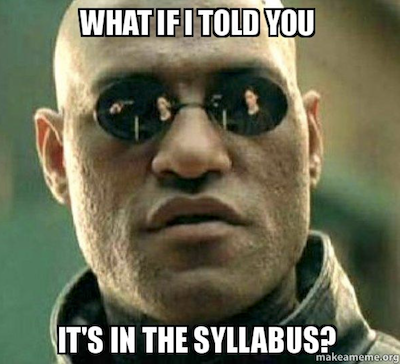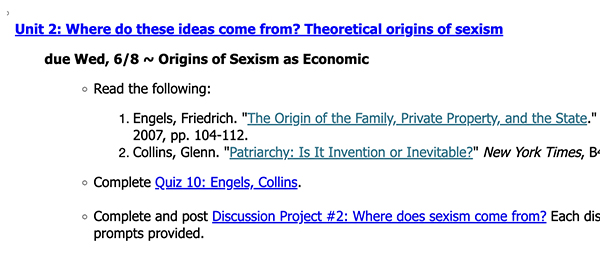June 2022
I hear it all the time: Faculty vent about how needy our students have become, how they're more underprepared than ever, how they lack self-regulation, how they fail to do even the basics of the course and—a favorite punching bag—how they simply do not read the syllabus. I totally get the frustration, and I too have privately expressed annoyance to friends about how students perennially ask questions for which the answers are sitting right there IN THE SYLLABUS. And I write very careful, detailed, thoughtful syllabi that are subdivided into separate pages in my class website, so it's not even like students have to wade through a 10-page pdf to find the answer. Yet they keep not reading our syllabi. And yet we keep complaining about our students not reading our syllabi. The best teachers trust their students rather than blame them It's time to ask ourselves what we can do differently to help this situation. For starters, we can learn to look at our syllabi from our students' perspective. We know from Ken Bain's What the Best College Teachers Do—for which he studied nearly 100 college teachers over 15 years—that the best professors establish a learning atmosphere in which students trust that their work will be assessed fairly and objectively. The best professors treat their students with respect too, no matter how much students might struggle or need extra assistance. And the best professors, as noted in this 2015 NPR piece, trust their students rather than blame them. This is something I had learned as a new parent from educational theorist Alfie Kohn's Unconditional Parenting, and the same holds true for the best professors. The most effective ones "attribute... the best possible motive consistent with the facts." In other words, don't make assumptions about your students, focus on the facts and trust your students rather than blame them. Maybe they did read the syllabus and forgot? Or honestly confused your policy with their other professors' policies? Or maybe they started reading your syllabus but were distracted by something (their kid yelled "MOM!" at that moment or their employer called them to cover an extra shift)? The point is, let's recalibrate so that we are emphasizing in our syllabus 1) our classes as a learning experience, 2) our relationships with our students and 3) a warmer and more inviting tone. A thought provoking article from The Chronicle of Higher Ed in 2018 asks us to ponder what we really want students to remember about our class in 20 years. Glance at those faculty responses and reflect on your own, and I think you'll see that maybe it doesn't matter so much whether students present their work in a certain font size or always remember to include your class CRN in their emails to you (I've seen both of these items, among others, specified on multiple colleagues' syllabi). Core ideas for revising your syllabus What students tend to see in many syllabi are overly legalistic, unwelcoming, unfriendly and distant lists of rules—and threats of punishment for not adhering to those rules. Let's be honest: This doesn't exactly make for the most engaging reading, especially when we toss in liberal amounts of bold, underlined, italicized font to show students that we really mean it. The Tulane Center for Engaged Learning and Teaching shows in the Accessible Syllabus site how we can reconsider our syllabi in terms of our images, text, rhetoric and policies to make them more inclusive. This can include making your policies more inclusive overall as well as other ways as shown below.
A JEDI Institute summer project This summer, as part of the JEDI Institute, we will be working toward developing some specific advice and sample/model language for revising our syllabi with greater inclusivity and readability in mind. Since a core tenet of the JEDI Institute is becoming more equity minded and less deficit minded about our students, we hope that all faculty will consider starting off fall 2022 with more inclusive, warm and welcoming syllabi. Below are some resources and initial ideas to help you get started. Or, even better, if you'd like to participate in the inclusive syllabus project, reach out to any of our JEDI Institute executive board members and let us know in what ways you'd like to contribute.
Finally, right here in this issue of The WORD, our current guest columnists Kristen Hoffman and Murph Kinney both share more examples about how to be more aware of our students' perspectives, so I encourage you to read those smart pieces as well. |


